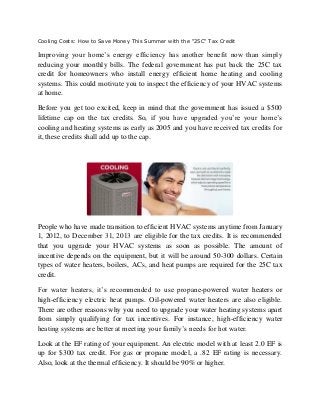
Money saving options with sensible decisions!
- 1. Cooling Costs: How to Save Money This Summer with the "25C" Tax Credit Improving your home’s energy efficiency has another benefit now than simply reducing your monthly bills. The federal government has put back the 25C tax credit for homeowners who install energy efficient home heating and cooling systems. This could motivate you to inspect the efficiency of your HVAC systems at home. Before you get too excited, keep in mind that the government has issued a $500 lifetime cap on the tax credits. So, if you have upgraded you’re your home’s cooling and heating systems as early as 2005 and you have received tax credits for it, these credits shall add up to the cap. People who have made transition to efficient HVAC systems anytime from January 1, 2012, to December 31, 2013 are eligible for the tax credits. It is recommended that you upgrade your HVAC systems as soon as possible. The amount of incentive depends on the equipment, but it will be around 50-300 dollars. Certain types of water heaters, boilers, ACs, and heat pumps are required for the 25C tax credit. For water heaters, it’s recommended to use propane-powered water heaters or high-efficiency electric heat pumps. Oil-powered water heaters are also eligible. There are other reasons why you need to upgrade your water heating systems apart from simply qualifying for tax incentives. For instance, high-efficiency water heating systems are better at meeting your family’s needs for hot water. Look at the EF rating of your equipment. An electric model with at least 2.0 EF is up for $300 tax credit. For gas or propane model, a .82 EF rating is necessary. Also, look at the thermal efficiency. It should be 90% or higher.
- 2. For furnace and boilers, an AFUE rating of 95% or higher is necessary for a tax credit of $150. So, replace your furnaces or boilers if they don’t meet that criterion. Also, check out the air circulating fan of your heating system. An advanced main fan for your heaters can add $50 to your incentive. Look at your heating system if it’s still working properly. If not, then you have more pressing reasons for upgrading your equipment. Summer is coming and so are the hot, humid days. It’s now time to check your air conditioners if they are working properly. Old ACs may be consuming a lot of power, while pumping less cool air into your room. Check out packaged central air conditioning systems with a minimum of 14 SEER and 12 EER ratings. Do that to have $300 tax incentive. Some homeowners have installed an air source heat pump that warm rooms in winter and cool them in summer. Instead of For Further Information Visit : http://www.nrgair.com/air-conditioning-los-angeles